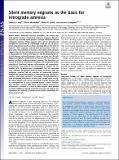Silent memory engrams as the basis for retrograde amnesia
Author(s)
Roy, Dheeraj; Muralidhar, Shruti; Smith, Lillian; Tonegawa, Susumu
DownloadE9972.full.pdf (1.992Mb)
PUBLISHER_POLICY
Publisher Policy
Article is made available in accordance with the publisher's policy and may be subject to US copyright law. Please refer to the publisher's site for terms of use.
Terms of use
Metadata
Show full item recordAbstract
Recent studies identified neuronal ensembles and circuits that hold specific memory information (memory engrams). Memory engrams are retained under protein synthesis inhibition-induced retrograde amnesia. These engram cells can be activated by optogenetic stimulation for full-fledged recall, but not by stimulation using natural recall cues (thus, amnesia). We call this state of engrams “silent engrams” and the cells bearing them “silent engram cells.” The retention of memory information under amnesia suggests that the time-limited protein synthesis following learning is dispensable for memory storage, but may be necessary for effective memory retrieval processes. Here, we show that the full-fledged optogenetic recall persists at least 8 d after learning under protein synthesis inhibition-induced amnesia. This long-term retention of memory information correlates with equally persistent retention of functional engram cell-to-engram cell connectivity. Furthermore, inactivation of the connectivity of engram cell ensembles with its downstream counterparts, but not upstream ones, prevents optogenetic memory recall. Consistent with the previously reported lack of retention of augmented synaptic strength and reduced spine density in silent engram cells, optogenetic memory recall under amnesia is stimulation strength-dependent, with low-power stimulation eliciting only partial recall. Finally, the silent engram cells can be converted to active engram cells by overexpression of α-p-21–activated kinase 1, which increases spine density in engram cells. These results indicate that memory information is retained in a form of silent engram under protein synthesis inhibition-induced retrograde amnesia and support the hypothesis that memory is stored as the specific connectivity between engram cells.
Date issued
2017-09Department
Massachusetts Institute of Technology. Department of Biology; Massachusetts Institute of Technology. Department of Brain and Cognitive Sciences; Picower Institute for Learning and Memory; RIKEN-MIT Center for Neural Circuit GeneticsJournal
Proceedings of the National Academy of Sciences
Publisher
National Academy of Sciences
Citation
Roy, Dheeraj S., et al. “Silent Memory Engrams as the Basis for Retrograde Amnesia.” Proceedings of the National Academy of Sciences, vol. 114, no. 46, Nov. 2017, pp. E9972–79. © 2017 National Academy of Sciences
Version: Final published version
ISSN
0027-8424
1091-6490